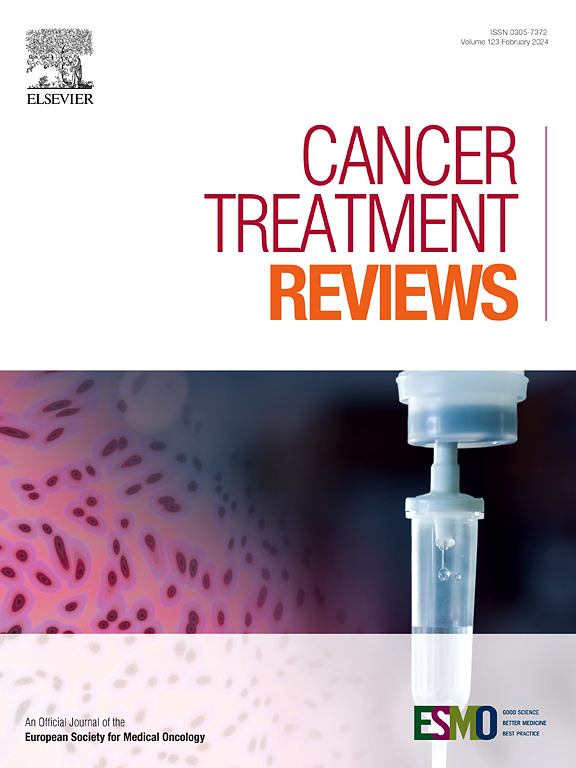Surgical tumor volume reduction in patients with brain metastases: A systematic review and meta-analysis
IF 9.6
1区 医学
Q1 ONCOLOGY
引用次数: 0
Abstract
Background
Microsurgical resection of brain metastases (BM) has traditionally been a mainstay of local control for large or symptomatic lesions. Maximal tumor burden reduction remains controversial in the multidisciplinary management of BM patients and needs to be re-evaluated in view of new systemic treatment options. We conducted a systematic review and meta-analysis to evaluate the role of extent of resection (EOR)/residual volume (RV) for progression-free (PFS) and overall survival (OS) in patients with BM.
Methods
A systematic review was performed according to PRISMA guidelines and included studies’ quality was assessed with the Grading of Recommendations, Assessment, Development, and Evaluations (GRADE) tool. Study characteristics were tabulated and critically reviewed. Results from Cox-regression models and log-rank tests for the association of gross total resection (GTR) versus subtotal resection (STR) with PFS and OS were extracted to perform separate random-effects meta-analyses.
Results
Thirty-nine articles were included, all of them being retrospective and all but 3 monocentric. Most studies included BM from heterogenous primary tumors, with 9 focusing on BM from a single primary. Systemic therapies were variably reported and only 2 studies reported on the use of steroids. Twenty-one studies showed a significant association of EOR/RV with improved OS. Meta-analysis of studies reporting multivariable Cox-regression models (n = 11) showed a significant association of GTR with longer OS (HR 0.67, 95 %CI 0.56–0.81, p < 0.001).
Conclusion
Although in several studies higher EOR/lower RV was associated with improved OS, evidence consists of heterogeneous cohorts and rarely includes primary tumor-specific systemic therapies or relevant confounding covariates. New studies are needed to elucidate the role of microsurgical tumor burden reduction in BM patients in the era of targeted or immune modulatory therapies.
脑转移患者手术肿瘤体积减少:系统回顾和荟萃分析
背景:显微外科手术切除脑转移瘤(BM)传统上是局部控制大型或症状性病变的主要方法。最大限度地减轻肿瘤负担在BM患者的多学科管理中仍然存在争议,需要根据新的全身治疗方案重新评估。我们进行了一项系统回顾和荟萃分析,以评估切除范围(EOR)/残余体积(RV)对BM患者无进展(PFS)和总生存期(OS)的作用。方法按照PRISMA指南进行系统评价,采用推荐、评估、发展和评价分级(GRADE)工具对纳入研究的质量进行评价。将研究特征制成表格并进行严格审查。从cox回归模型和log-rank检验中提取总全切除(GTR)与次全切除(STR)与PFS和OS相关性的结果,进行单独的随机效应荟萃分析。结果共纳入39篇文献,均为回顾性文献,除3篇为单中心文献外,其余均为回顾性文献。大多数研究包括来自异质原发肿瘤的脑转移,其中9项研究关注来自单一原发肿瘤的脑转移。系统性治疗的报道各不相同,只有2项研究报道了类固醇的使用。21项研究显示EOR/RV与OS改善有显著关联。对报告多变量cox回归模型的研究(n = 11)进行荟萃分析显示,GTR与较长的生存期显著相关(HR 0.67, 95% CI 0.56-0.81, p <;0.001)。虽然在一些研究中,较高的EOR/较低的RV与改善的OS相关,但证据是由异质性队列组成的,很少包括原发性肿瘤特异性全身治疗或相关的混杂协变量。在靶向或免疫调节治疗时代,需要新的研究来阐明显微外科手术减轻BM患者肿瘤负担的作用。
本文章由计算机程序翻译,如有差异,请以英文原文为准。
求助全文
约1分钟内获得全文
求助全文
来源期刊

Cancer treatment reviews
医学-肿瘤学
CiteScore
21.40
自引率
0.80%
发文量
109
审稿时长
13 days
期刊介绍:
Cancer Treatment Reviews
Journal Overview:
International journal focused on developments in cancer treatment research
Publishes state-of-the-art, authoritative reviews to keep clinicians and researchers informed
Regular Sections in Each Issue:
Comments on Controversy
Tumor Reviews
Anti-tumor Treatments
New Drugs
Complications of Treatment
General and Supportive Care
Laboratory/Clinic Interface
Submission and Editorial System:
Online submission and editorial system for Cancer Treatment Reviews
 求助内容:
求助内容: 应助结果提醒方式:
应助结果提醒方式:


